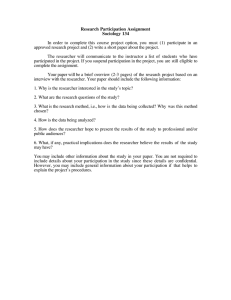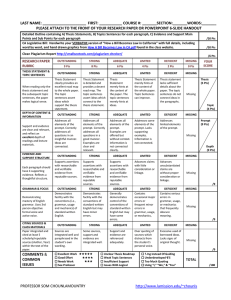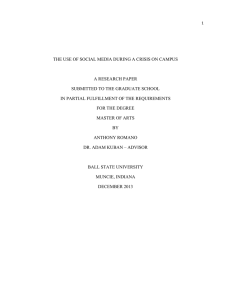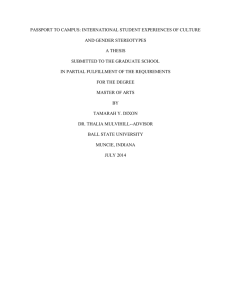Data Services Committee meeting - April 30, 2012 Data Purchase Program:
advertisement
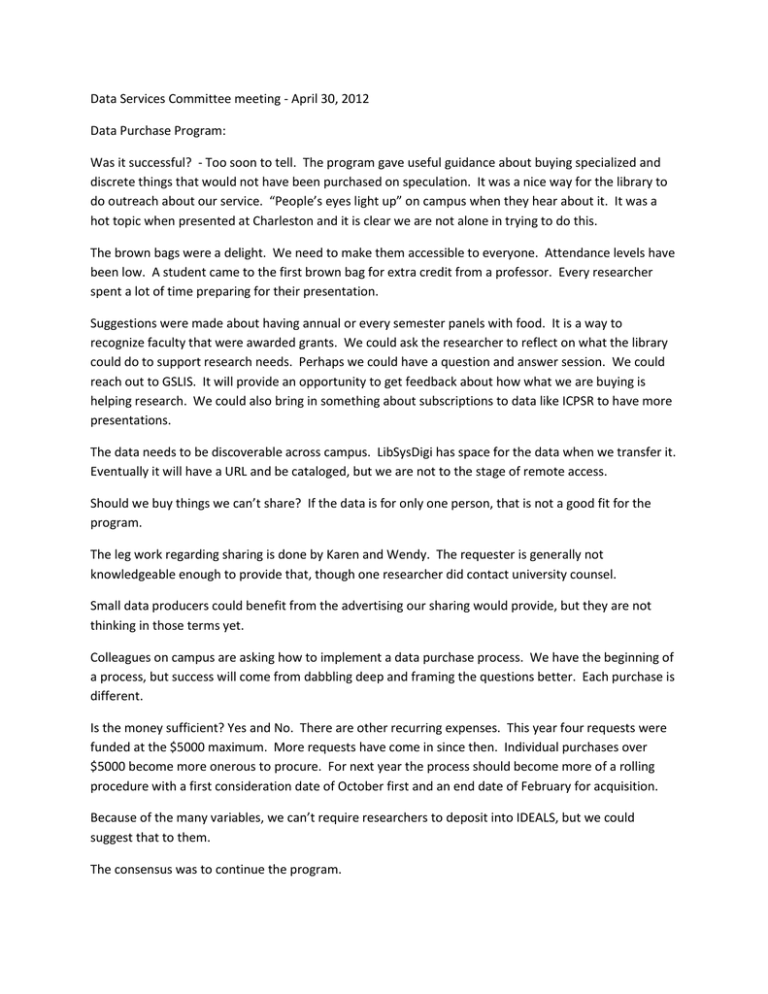
Data Services Committee meeting - April 30, 2012 Data Purchase Program: Was it successful? - Too soon to tell. The program gave useful guidance about buying specialized and discrete things that would not have been purchased on speculation. It was a nice way for the library to do outreach about our service. “People’s eyes light up” on campus when they hear about it. It was a hot topic when presented at Charleston and it is clear we are not alone in trying to do this. The brown bags were a delight. We need to make them accessible to everyone. Attendance levels have been low. A student came to the first brown bag for extra credit from a professor. Every researcher spent a lot of time preparing for their presentation. Suggestions were made about having annual or every semester panels with food. It is a way to recognize faculty that were awarded grants. We could ask the researcher to reflect on what the library could do to support research needs. Perhaps we could have a question and answer session. We could reach out to GSLIS. It will provide an opportunity to get feedback about how what we are buying is helping research. We could also bring in something about subscriptions to data like ICPSR to have more presentations. The data needs to be discoverable across campus. LibSysDigi has space for the data when we transfer it. Eventually it will have a URL and be cataloged, but we are not to the stage of remote access. Should we buy things we can’t share? If the data is for only one person, that is not a good fit for the program. The leg work regarding sharing is done by Karen and Wendy. The requester is generally not knowledgeable enough to provide that, though one researcher did contact university counsel. Small data producers could benefit from the advertising our sharing would provide, but they are not thinking in those terms yet. Colleagues on campus are asking how to implement a data purchase process. We have the beginning of a process, but success will come from dabbling deep and framing the questions better. Each purchase is different. Is the money sufficient? Yes and No. There are other recurring expenses. This year four requests were funded at the $5000 maximum. More requests have come in since then. Individual purchases over $5000 become more onerous to procure. For next year the process should become more of a rolling procedure with a first consideration date of October first and an end date of February for acquisition. Because of the many variables, we can’t require researchers to deposit into IDEALS, but we could suggest that to them. The consensus was to continue the program. Data Consultation Hours: Dawn has been having 3 or 4 people each time. The Survey Research Lab has had a queue the past two times with one hour per person. Most people have heard by word of mouth, but we should continue the advertising. Flyers could be provided for the new faculty orientation August 22-23 and we could look into connecting with any campus wide graduate students’ orientation. Promotions include Inside Illinois, the Daily Illini, cards and posters. The Scholarly Commons can fund mailing post cards, but they will need to be redesigned for postal addresses. There are no set consultation hours during the summer, but are available for one-on-one. The datagis email traffic has dropped off to about one per month and needs to be advertised more. Read Me Files: Not all the information for the read me files can be found from the application, some needs to be drawn from the data files. We should try to fill in as much as we can. The readme template could use the addition of an email address of the data provider. The read me files will be placed alongside the data files. Catalog entries will make restrictions clear such as current uiuc or non-requestable. The researcher’s name should not be on the public read me files, but should be recorded along with other hidden data such as costs. Institutional history should be maintained. “Why did we purchase this data? “, along with a decision page, the application and evaluation forms should be stored on the G drive. Ana Popova presentation: Attended by five people, the presentation went well. She really explained the different ways to tally votes. She ranked presidential candidates using multi-year survey data. Scheduling the next meeting: The next normal date falls on Memorial Day, so we are not meeting then. ATLAS begins moving on June 11 and with vacation schedules they can’t meet before July. June 25 is ALA. Work on the postcards and read me files can be done virtually. The next meeting will be sometime in July, but the exact date hasn’t been set yet. We will meet in the newly remodeled Lincoln Hall.

